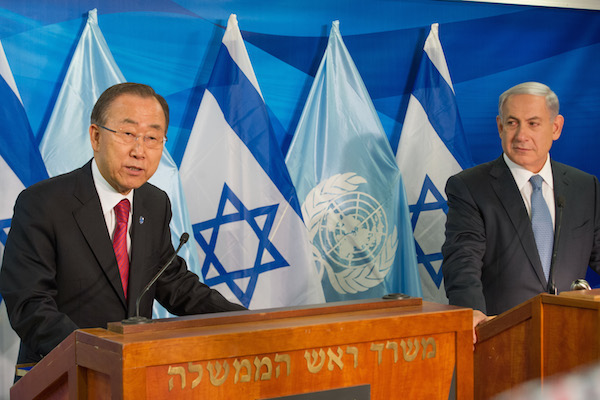A week of encouraging signs augurs revival of anti-occupation cause.
My view of the chances that the occupation will end someday fluctuates between pessimistic and despairing. Since the war in Gaza, I’ve felt the cause was effectively lost; I figured that if the monstrous devastation that Israel visited on the Strip and its people did not light a fire under the world’s ass, then the anti-occupation movement was on a slow boat to nowhere. But just in the last week there have been a number of delayed international reactions (and even one from Israel) to the Gaza war, and they add up to what I see as a critical mass of encouraging signs that is weighty enough, at least, to argue against despair.
The clearest one was the international donors’ pledge in Cairo of $5.4 billion for the reconstruction of Gaza. The Palestinian Authority had only asked for $4 billion; expectations had been for $1.5 billion. This is a serious investment by the world, and a strong demand for change.
It was backed up by UN Secretary-General Ban Ki-moon’s speech at the conference, in which he blamed the war on the occupation. “We must not lose sight of the root causes of the recent hostilities: a restrictive occupation that has lasted almost half a century, the continued denial of Palestinian rights and the lack of tangible progress in peace negotiations,” Ban said. He followed it up the next day in Jerusalem by slamming Netanyahu’s diplomatic stonewalling and settlement-building in a joint news conference with the prime minister, who was not amused.

There was also the speech at the donors’ conference by Egyptian President Abdel Fattah al-Sissi calling on Israel to accept the Arab Peace Initiative. Sissi is a brutal autocrat, he doesn’t yearn for justice for anyone, but his speech was a sign that he is not in Israel’s pocket as Israelis like to think, and that he may be thinking that championing the Palestinian cause will enhance his prestige and power in the Arab world, which would not be good for the Netanyahu government.
Then there was the vote by the British parliament to recognize a Palestinian state immediately. Prime Minister David Cameron opposed the motion and said it would not change his government’s policy, but again, it sent a message and, coming a week after the new Swedish prime minister, Stefan Lofven, announced that Sweden would recognize Palestine as a state, it was part of what appears to be a gathering momentum.
There were some powerful statements in the British parliament debate. From Tuesday’s New York Times:
Richard Ottaway, a Conservative lawmaker and chairman of the House of Commons foreign affairs committee, said that he had “stood by Israel through thick and thin, through the good years and the bad,” but now realized “in truth, looking back over the past 20 years, that Israel has been slowly drifting away from world public opinion.”
“Under normal circumstances,” he said, “I would oppose the motion tonight; but such is my anger over Israel’s behavior in recent months that I will not oppose the motion. I have to say to the government of Israel that if they are losing people like me, they will be losing a lot of people.”
The Times story also noted the new international atmosphere in which the British vote was held, and had some interesting quotes to illustrate it:
Romain Nadal, the French Foreign Ministry spokesman, said Monday that France “will have to recognize Palestine,” but he did not specify when the official recognition would take place.
The last conflict in Gaza “has been a triggering factor,” Mr. Nadal said. “It made us realize that we had to change methods.”
The Times also quoted Avi Primor, a former Israeli ambassador to the European Union and now head of the Israeli Council on Foreign Relations, who had told the Times of Israel early in the Gaza war that he was “not particularly worried” about the world’s reaction to it. He explained to ToI in July that “nobody likes Hamas,” that everyone saw that Israel had shown restraint, and that European governments were put off by angry pro-Palestinian demonstrations. Yet here is the Times’ quote of Primor speaking after the vote in the British parliament:
“The problem is that we are drastically losing public opinion,” Avi Primor, the director of European studies at Tel Aviv University and a former Israeli ambassador to the European Union, told Israel Radio on Monday. “This has been going on for many years, and became particularly serious after the talks failed between us and the Palestinians after nine months of negotiations under Kerry, and even more so after Operation Protective Edge.”
And in Israel, a long list of prominent liberal Zionists urged the British parliament to pass the resolution to recognize Palestine, which meant these Israelis were siding with a foreign political entity against their country’s government, which is not the sort of thing Israeli liberals ordinarily do. To borrow from the French spokesman, the Gaza war had evidently been a “triggering factor” for these two-staters, making them “realize that [they] had to change methods.’”
So the shock of the Gaza war seems to be wearing off, and the anti-occupation movement may be escalating. There is reason again for guarded hope. But finally, it’s up to the Palestinians – and here, too, things seem to be moving. PA President Mahmoud Abbas has committed himself so deeply to pursuing statehood at the UN Security Council, and if that fails – which the U.S. will guarantee with a veto – to challenging the occupation at The Hague, that it seems impossible he will pull his punches again.
This is no time for optimism, God forbid. But it’s no time for despair, either.
Related:
Labour MPs: Vote yes on Palestinian statehood
Seven years later, Israel decides Gaza blockade is ineffective
A siege of inertia: Israel’s non-policy on Gaza

